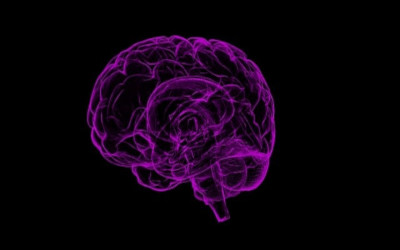The human brain is the central organ of the human nervous system. Together with the spinal cord, it belongs to the central nervous system. In the central nervous system, grey and white matter can be distinguished. The grey matter is mainly composed of the bodies of nerve cells, while the white matter is made up of the long remnants of nerve cells. The cortex of the cerebrum consists mainly of the corpus callosum, with the white matter underneath. In the spinal cord, however, the corpus callosum is internal, and the white matter forms the outer layer. The brain has control over our body. It processes, assimilates, and coordinates information from the sensory organs and makes decisions about how the body is going to react to the information it gets. The brain contains neurons and glial cells.
Fact 1: There are 100 billion neurons in the brain.
It is thought that there are almost the same number of stars in the Milky Way. All these neurons are connected with trillions of connections, also known as synapses. It is also known as ‘neuron forest’. All the information we get from the world around us and from our body runs between those neurons. The fastest information to pass between neurons is 402 km/h.
Fact 2: Humans use more than 10% of their brain.
We are using it all. In fact, we use more than 10% also while we are sleeping. Although it’s true that not all areas of the brain are working at the same time at all times. The fact that we actually use all of our brain is proven with MRI and PET scans. This technique shows us our brain activity in real time.
Fact 3: The brain can’t feel pain.
Our brain translates the information it gets from the nerve cells, but it itself doesn’t have any pain receptors. But the meninges, periosteum, and scalp have pain receptors. Technically, you can do a surgery on the brain without any painkillers. The pain we feel during a headache comes from other nerves, the ones that are inside our vessels.
Fact 4: A brain freeze is really a sphenopalatine ganglioneuralgia.
I’m sure that everyone has experienced a brain freeze. It happens when we drink or eat something really cold. It cools down our blood vessels and arteries in our throat, and these are the ones that bring the blood to the brain. They shrink when they’re cold and open again when they’re warm again, creating pain in your forehead. The pain is a sign to stop this action because it can cause temperature changes.
Fact 5: The brain uses 20% of the oxygen and blood in your body.
The brain needs oxygen supply all the time. The harder you think, the more oxygen your brain needs. If the brain is without oxygen for more than five minutes, then it has already caused serious brain damage. Every minute, 750 to 1000 milliliters of blood run through the brain.
Fact 6: The human brain weighs around 1.2 to 1.4 kg.
Compared to other mammals, humans have much larger brains. The human brain is around 2% of our body mass. The average brain weight for an adult is between 1300 and 1400 grams. The human brain grows until age 25. The brain develops from back to front. The frontal part is responsible for decision-making and controls expressions. A baby’s brain weighs around 350 to 400 grams. The average brain measurements are 140 x 167 x 93 mm.
Fact 7: Multitasking is impossible.
Multitasking is context-switching, so it means we are changing our activities quickly back-and-forth. This means we can’t do them at the same time; we just learn to make the changes really quickly. Different researchers have shown that if you try to multitask, the error rate goes up to 50%, and it might take twice as long.
Fact 8: Headaches are caused by a chemical reaction.
The primary headache is caused by the chemical activity in your brain and also by the nerves and blood vessels surrounding the skull. Pain is also caused by the muscles in your head and neck.
Headache is also caused by serotonin or estrogen. They cause pain when their amount is chained, and it causes migraines. Serotonin levels affect both men and women, but estrogen affects only women.
Fact 9: Your brain also needs exercise.
Since exercising raises your heart rate, it also increases the blood flow to your brain. The increased breathing pumps more oxygen into your bloodstream, and it also reaches your brain. This helps to produce more neurons in the part of the brain where memory and thinking are controlled. Neurogenesis increases brain volume. It is believed that it also helps fight against dementia.
Fact 10: Your brain needs deep sleep.
Your whole body, including the brain, needs sleep to function normally. Your memory, judgment, and reaction time will be impacted if you don’t get enough sleep. If you don’t get enough sleep, it kills the brain cells. Scientists also think that deep sleep helps the cerebrospinal fluids reach your brain, and their job is to ‘wash’ the brain from toxins. Deep sleep helps retain memory. When you are sleepy, we start to yawn. Why? It helps to cool the brain because, during sleep, the brain temperature rises.

Sources:
https://www.hopkinsmedicine.org/health/conditions-and-diseases/anatomy-of-the-brain
https://en.wikipedia.org/wiki/Human_brain
https://www.piedmont.org/living-real-change/10-fun-facts-about-your-brain
https://www.healthline.com/health/fun-facts-about-the-brain#21-fun-facts-about-the-brain
https://www.dentinstitute.com/22-facts-about-the-brain-world-brain-day/
https://www.verywellmind.com/how-big-is-the-brain-2794888
https://www.nature.com/scitable/blog/mind-read/lucy_is_wrong_we_use/
https://www.hariduskeskus.ee/opiobjektid/anatoomia/?N%C3%84RVIS%C3%9CSTEEM___KESKN%C3%84RVIS%C3%9CSTEEM
https://www.scientificamerican.com/article/deep-sleep-gives-your-brain-a-deep-clean1/
https://www.ohsu.edu/brain-institute/understanding-headaches-and-migraines
